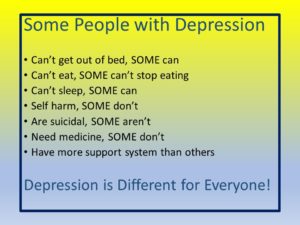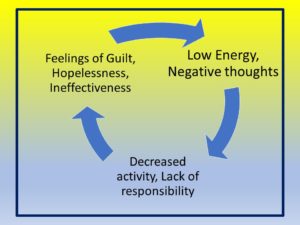When Charles Darwin came up with his theory for “survival of the fittest”, he did not mean physical fitness alone as a key to survival. Possibly to a large extent he meant to include “Mental Fitness” too. In the present day corporate lives and framework, Anxiety and Depression are much more common ailments than a regular cough. Sadly, there is a very little focus in our society to recognize and identify ways to handle them.

Depression due to its disguised nature is often overlooked. People suffering from depression usually do not talk about their low moods or negative thoughts. They rather complain of various physical problems like chronic headaches, heartburn or indigestion. Clinical depression can affect the whole body including one’s mood and thoughts and, may result in severe malfunctioning of an individual.
Symptoms of Depression
We all experience from time to time some of the following symptoms, which may not necessarily mean one is depressed. At the same time, not everyone who experiences depression will have all of these signs and symptoms. People may experience changes in sleep patterns, appetite, thoughts, and mood.

Depression can be called when one has been depressed for more than two weeks, felt sad, down or miserable most of the time, or have lost interest or pleasure in usual activities, and have also experienced several of the signs as below.
Physical Clues
- Tired all the time; Chronic Fatigue
- Unexplained Aches and Pains; Headaches and Muscle pains
- Sleeping too much or too little
- Loss or change of appetite; Significant weight loss or gain
- Substance Abuse
Emotional Clues
- Sadness
- Anxiety
- Guilt
- Anger
- Mood swings
- Hopelessness
- Helplessness
- Irritability
- frustration
- lacking confidence
- miserable
Behavioral Clues
- Crying
- Withdrawl from close family and friends; not going out
- Neglecting responsibilities
- Relying on alcohol and sedatives
- not doing usually enjoyable activities
Cognitive Clues
- Frequent Self Criticism: I’m a failure; It’s my fault; I’m worthless.
- Negative Thoughts: Nothing good ever happens to me.
- Thoughts of death and Self-harm: Life’s not worth living; People would be better off without me.
- Indecisiveness and Confusion
- Impaired memory and Unable to concentrate
Depression is Different for Everyone

Depression is not a sign of weakness.Depression can attack anyone at any point in time in life inadvertently.
CASE
Madhav (name changed) came to seek counseling 6 months after his PET results. He had secluded himself up in his room since he had been unsuccessful. He mentioned that he had been feeling sad and ashamed of, and did not feel like getting up in the morning. He had no energy to do anything and lay on the bed for long hours during the daytime. He had also lost his sleep and appetite. Madhav had been ruminating over his result and was in despair.
CASE
Mrs. Sharma brought her 25-yr old daughter, Bhavna (name changed) to me when she had attempted suicide by cutting her wrist. Bhavna got married four years ago, but only after eight months of her marriage, she started having serious troubles with her husband. A prolonged 3 years of struggle in her marriage forced her to come back to her parents, but she was not able to overcome the pain and anguish. Bhavna said, “I do not feel good enough to live”. She held herself responsible for the broken relationship and felt too much guilty.
CASE
Mr. Prakash experienced chronic pain in his shoulders and hands every morning, without any distinct physical cause. He was not able to sleep well at nights and had mood swings. Mr. Prakash had worked at a senior managerial post in a private company and retired about a year ago. He led a contented life. So, it was difficult for him to accept that he was not able to maintain equanimity now, and was falling into deep sadness.
The Vicious Cycle of Depression

Those who experience depression may find it as a vicious circle where one symptom feeds another and there is no way out. For instance, failure in an exam may lead a student to conclude that he is a loser. Such negative thoughts will certainly make him feel sad and helpless; this, in turn, will lead to lethargy and listless, and he may spend the whole day sealed in a cell. Being inactive for a long time would further enhance his feelings of incompetence.
Breaking The Cycle

Physical Workouts
One way to break the cycle can be physical workouts. In Madhav’s case, to counter the physical slowdown of depression, the need was to start some physical exercise routine; like walking, jogging, yoga or any sports activity. He was suggested not to focus on his thoughts, but engage himself in activities mechanically. I further asked him to make a chart every night, writing the plan for the next day. Such night-charts were helpful in motivating him to get out of the bed every morning. Doing physical exertion eventually helped Madhav with his appetite and sleep too.
Working on Self-esteem
Depression not only soaks up physical energy but also lowers one’s self-esteem. It makes a person feel worthless, helpless, and even suicidal.
Bhavna, since the time she came back to her parents, was self-critical and kept herself distant from others. To break the cycle, it was essential that she “get interested in others’ lives”. She had a younger brother who was struggling for a job. During counseling sessions, she was helped to shift her focus from her life to her brother’s, for the while. I asked her to help her brother in his preparations for the interviews. With due efforts, she was able to regain her energy and divert it towards helping her brother. Not only she evolved a better relationship with her brother but also was able to feel good about herself. In due course, Bhavna was able to calm her self down to think rationally about her situation.
Engaging in Structured Activities
For Mr. Prakash, the new routine with no work was difficult to adjust. His habitual pain in the shoulders every morning (the time when he used to be most active earlier) was possibly a result of the emptiness in his life. It was important for him to look for new avenues to keep himself engaged in something and develop a new self-image.
There are many people like Prakash who find a sad vacuum in their lives after retirement from work. In fact, in old age death of the spouse and incessant illness also adds to the reasons to feel sad. Activities like: doing house chores, learning computer and Internet, getting involved in religious rituals, go to spiritual talks, reading books of interests (other than work), teaching or playing with grandchildren, work on hobby like painting, sculpting, gardening, or developing new hobby, can be explored; and one may identify those which might make him/her busy and feel better.
Forcing yourself to some structured activities in day-to-day routine helps in releasing the turbulent feelings that accompany depression. If you have locked yourself up in a room, then come out of your shell and force yourself to talk to someone.
Giving Expression to your Story
If you cannot find someone to talk to, try writing your thoughts and feelings. Giving expression to them eventually helps one to put the thoughts in order and react more rationally. Writing personal diary also helps in overcoming feelings of anger and remorse.
Depression is sometimes a result of illogical thinking and skewed perception of sore events of life. In counseling, I ask my clients to write the ‘story’ of their distressful life events; and then help them to see the same ‘story’ from a different perspective and a positive approach. Talking to someone and getting objective feedback, helps in changing one’s maladaptive thinking pattern, which might be backing up the depression.
CASE
Rashmi, a 17-year-old school student, was very resilient and bereft of hope when she came for counseling. Her parents reported that she had been crying all the day, not going to school and not talking to anyone; it was going on for more than two weeks. Rashmi was not ready to talk about anything. She said, “Nothing can help me, not even talking to you!” I asked her if she was happy with her present state? When she said “No”, I asked her to answer to herself, a few more questions: “What benefit is she getting out of being in the current state? What is it doing for her? Does she really want to change? What will she gain or lose if she tries to change? If she was not depressed, then what should she be doing?” If in depression, ponder over such questions.
“If you want to better your future, you need to disturb your present!”

Keep Patience with yourself
Nonetheless, don’t expect to snap out of your depression. It doesn’t happen instantly. Instead, help yourself as much as you can. Read self-help books; write a journal or personal diary; talk to someone and share your thoughts and feelings; engage your self in some structured physical activity. If you know someone who is possibly depressed then do not accuse him/her of faking illness or laziness; but provide emotional support, and if needed, help the person get professional help.
The need is to know and act!